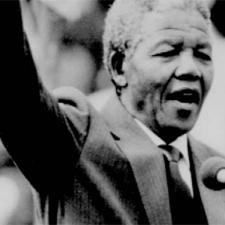
Nelson Mandela - The (Small) Chess Connection
Today the world stood still for a moment, mourning the death of one of the true greats of recent history. It was one man who dominated the newspapers, websites and tv programs: Nelson Mandela. The South African leader, who passed away on December 5th at the age of 95, was one of the greatest leaders of the 20th century. There's a chess connection, albeit a small one.
In June 2010 the New York Times reported that...
[d]uring a state visit to Britain in March, President Jacob Zuma of South Africa went to Buckingham Palace, where there was an exhibition of items from his country. During the tour, Queen Elizabeth II showed President Zuma a chess set that Nelson Mandela gave her in 1996. The pieces appear to be African tribesman.
Kevin Spraggett has more on this chess set.
So... Mandela did play chess. Before we get to that, here's Jonathan Rowson in his chess column of today speculating about what kind of player he would have been:
When I think of what Mandela’s story has to offer the chess player, I would say patience, because he was in jail for a long time; courage, because he had to believe in himself and his ideas when the position was hostile to both; and imagination, because he had to see several moves ahead to a position with new rules and pieces with new powers, and still believe he could keep control.
America's National Public Radio (NPR) referred to an interview with Ahmed Kathrada, one of Mandela's closest confidants inside and later outside prison. In the interview, with Radio Diaries in 2004, Kathrada recalled Mandela playing a chess game for three days against a young medical student who had recently been incarcerated on the island.
"They played the first day, and when it came to lockup time, the game had not finished because Mandela calculates every move as he does in politics," Kathrada said.
Mandela persuaded one of the guards to lock the board away in an empty cell. At the end of the next day, the game was still not finished and the guard had to lock it away again.
"In the end, this young chap just gave up. He said, 'You win. I can't carry on this way,' " Kathrada said. "That's Mandela; it's a war of attrition and he won."
America's Public Broadcasting Service (PBS) published an interview with Neville Alexander, also a political activist and half Mandela's age when he arrived on Robben Island in 1964, the same year as Mandela. He was imprisoned there for ten years (Mandel for 27 years). When the interviewer asked "Tell me about how Mandela played chess," the answer was:
Well, chess and draughts were the two games which were the oldest on the island in a way. Draughts partly because we could play them without a board. Chess, eventually, when we did get a board. It became a favorite game, and he was one of those who knew the game quite well. My personal recollection is that in both draughts and chess Nelson's attitude was that of really attrition. That was his stance. He would take his time with every move, he would consider it very carefully. He would sort of mislead the other person by pointing things, this way, that way, the other and then making the move that wasn't expected and so on. But more than that, when he did make a really good move, then he would really crow and make the other person feel really small. I recall this particularly because of our late comrade, Don Davis, who eventually also joined the ANC incidentally. Don Davis used to think he was a really good draughts player, and Nelson and Andrew Mlangeni were his only two rivals ... He normally beat Nelson, but he tended not to beat Mlangeni. Mlangeni was very good. But the point is that Nelson would ... torture Don, that Don would sometimes just throw the board in the air, with pieces flying all over the place, getting really irritated. But [Mandela] had that way of, as I say, it was a war of attrition, and he tended therefore to be victorious in most cases.
Interviewer: He was excruciatingly slow in getting around to making his moves ...
Ja, it was deliberate you see. This is a point that with Nelson, again, you can't always be 100% sure, but it was largely deliberate because he knew that psychologically he was getting at the other person. By the way, I never played chess or draughts with them, because I just don't know the game well enough.
In our report on this year's Commonwealth Championship, which was posted on Mandela's 95th birthday, we wrote that among the prominent guests of the tournament were 13th World Champion Garry Kasparov but also Jacob Zuma, the South African President who attended the closing ceremony.
Zuma, who also spent ten years on Robben Island, said in his speech at the end of the tournament:
On Robben Island, chess provided a solace to us that we needed in those conditions of isolation and deprivation. It propelled our minds beyond the confines of the prison walls and allowed us to reflect and to position our thoughts strategically to fight the regime. (...) Many comrades made chess sets out of soap and driftwood that allowed us to continue to play this noble and great game. We improvised with makeshift chess boards and we enjoyed the fullness of the game.





